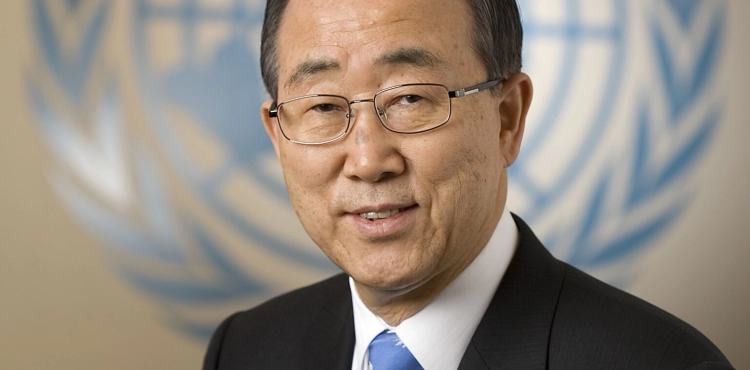The former Secretary-General of the United Nations and Vice President of the Organization of the Elders, Ban Ki-moon, wrote an article published by the American newspaper “Financial Times” today, Wednesday, in which he says, “It is time to recognize that the long-term approach which The international community’s approach to the Israeli-Palestinian conflict has failed and a new approach must be taken.”
Ban Ki-moon, who began his article by noting that the conflict between the Palestinians and Israel is not unequal, added, “The recent outbreak of violence, not only in Gaza and Jerusalem but also within the Arab and Jewish communities in Israel, has demonstrated…. The need for new thinking.
He stressed that "it must be realized, albeit belatedly, that it is clear that the Oslo Accords signed in 1993 no longer offer a practical path toward self-determination for the Palestinians, and have failed to achieve peace and security in Israel or Palestine."
The former UN Secretary-General warned, “Instead, Israel has pursued a policy of gradual, de facto annexation of the territories it has occupied since 1967, to the point that the prospects for a two-state solution have all but vanished. The starting point for any new approach should be to recognize the fundamental asymmetry between the parties, this is not a conflict of equals that can be resolved through bilateral negotiations, confidence-building measures or the reciprocal sequence of steps and traditional tools of conflict resolution.”
Ban Ki-moon explained, “The reality is quite different: a powerful state controls another people through open occupation, settling its people on the land in violation of international law and imposing a legal regime of institutionalized discrimination. Calls to return to unconditional bilateral talks every time there is a new outbreak of fighting will only perpetuate the status quo if these root causes are not addressed.”
The writer highlighted that “what has become increasingly evident in recent years, is Israel’s intent to maintain its structural hegemony and oppress the Palestinian people through unlimited occupation. This gives the dual legal regimes imposed by Israel in the Palestinian territories - along with the inhuman and arbitrary acts committed against the Palestinians - new significance, resulting in a situation that arguably constitutes apartheid, and it is now time for the international community to recognize and face the consequences of Israel´s policies and its actions in this regard.
Ki-moon warned, “The lack of any international legal accountability for Israel, … has enabled it to ignore successive United Nations resolutions, the most recent of which is Security Council Resolution 2334 of December 2016, which states that the construction of settlements violates international law, and this is why the provisions of The International Criminal Court — which has jurisdiction over the Palestinian territories and its plans to investigate war crimes committed by all sides — is very important and gives grounds for modest hope.”
The former Secretary-General of the United Nations warned that “the political cover provided by successive American governments to Israel is partly responsible for this lack of accountability, but what is encouraging is the emergence of various new alliances in the United States, and the administration of President Joe Biden must seize this moment and act.” With the European Union, the United Kingdom and others on a new approach consistent with their general commitments to uphold human rights in their foreign policies, “statements in favor of equal rights, security and prosperity for both Israelis and Palestinians seem hollow in the face of policies and actions that effectively undermine these principles.”
“Changes in the Israeli and Palestinian domestic political landscape also indicate that the status quo in recent years is being challenged from different directions,” Moon said.
The author warned that “the new Israeli government is based on an unusually broad coalition, … currently led by Prime Minister Naftali Bennett, who publicly rejects Palestinian rights and has long demanded the annexation of 60 percent of the West Bank classified under the Oslo Accords as Area C.” Meanwhile, progressive figures within the coalition government and Israeli civil society believe that the public mood is changing.
On the Palestinian level, the former UN Secretary-General said, “In Palestinian politics, new winds may be blowing, as President Mahmoud Abbas’s decision to cancel the planned elections, 15 years after his people went to the polls, revived Palestinian demands for their well-deserved democratic rights. to be respected by their leaders.
The writer ended his article by noting that “the international community has a critical role to play in providing its support to ensure a transparent, credible and democratic process that reflects the true will of the Palestinian people, and ending the occupation must remain the primary goal, with the immediate priority being the pursuit of equal rights for all those who They live in the land between the Jordan River and the Mediterranean Sea. Israelis, Palestinians, and their friends abroad who have the power to change course in a decisive way must seize this moment of change.”












